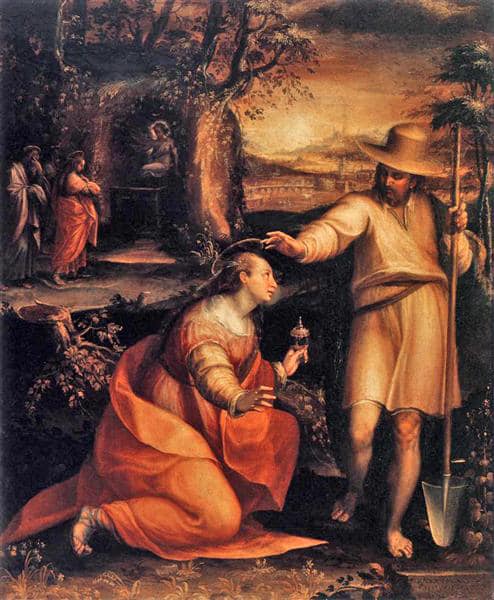 Gospel of 14 April 2020
Gospel of 14 April 2020
Tuesday within the Octave of Easter
John 20:11-18
'I have seen the Lord and he has spoken to me'
Mary stayed outside near the tomb, weeping. Then, still weeping, she stooped to look inside, and saw two angels in white sitting where the body of Jesus had been, one at the head, the other at the feet. They said, ‘Woman, why are you weeping?’ ‘They have taken my Lord away’ she replied ‘and I don’t know where they have put him.’ As she said this she turned round and saw Jesus standing there, though she did not recognise him. Jesus said, ‘Woman, why are you weeping? Who are you looking for?’ Supposing him to be the gardener, she said, ‘Sir, if you have taken him away, tell me where you have put him, and I will go and remove him.’ Jesus said, ‘Mary!’ She knew him then and said to him in Hebrew, ‘Rabbuni!’ – which means Master. Jesus said to her, ‘Do not cling to me, because I have not yet ascended to the Father. But go and find the brothers, and tell them: I am ascending to my Father and your Father, to my God and your God.’ So Mary of Magdala went and told the disciples that she had seen the Lord and that he had said these things to her.
Reflexion
If there is a memory from my childhood which this story triggers, it is that of the familiar nursery rhyme, “Mary, Mary, quite contrary, how does your garden grow?” Many see little significance in this silly children’s ditty but others believe that there are more serious or even insidious meanings hidden beneath the innocent text. Here we have Mary Magdalene and her garden.
Let’s not be too quick to judge Mary Magdalene for her short-sightedness and inability to recognise the Risen Lord. None of us would ever imagine the Risen Lord appearing to us in the guise of a gardener. Picture this - Shovel in his hand, a broad brim hat to keep out the sun, and hands soiled by filthy dirt after a hard day’s toil. The whole picture does not come any where close to the resurrected and glorified body of the Risen Lord.
But St John the evangelist deliberately adds these two not-so-insignificant points: that the tomb is located in a garden and Mary mistakes Jesus as a gardener. Immediately our thoughts return to the first garden planted by God in the Book of Genesis, but now disfigured and darkened by Adam’s sin.
The prophets sometimes use gardening metaphors to describe God’s work —for example, in Jeremiah 24:6, God says of the exiles from Judah, “I will build them up, and not tear them down; I will plant them, and not pluck them up.” Furthermore, John Chapter 15 casts God as a vinedresser.
John’s Gospel, also presents Christ’s resurrection as the beginning of something new. He mentions twice that Jesus rose on “the first day” of the week, as if this were the first day of a new creation. When read together with Paul’s idea of Jesus as the Second Adam (Romans 5:12-21) these allusions suggest that Jesus is the gardener of the new Eden, doing what Adam could not do. His resurrection broke ground in this garden, marking the beginning of a massive restoration project.
Behold, the Church is that great project where creation is restored. The Church is Christ’s New Eden, watered by the river of life, and tended lovingly so that it may bear abundant fruit. Christ is our second Adam who walks in this spiritual Eden to dress it and to keep it.
Mary may have mistaken Jesus for an ordinary gardener. Little did she realise that she was partially right. Her idea of Jesus was confined to that of her beloved teacher. She could not recognise Him as the Divine Gardener who “plants” us and grows the seed of faith in us so that we may bear the fruit of eternal life. Our Lord is the caretaker of humanity, bending down to bring us up, pruning us to make us grow, and providing us with nourishment to make us full, healthy and beautiful. He gets his hands dirty in the soil of our hearts, bringing us to life and cultivates us with care so that we can flourish. And one day, when He returns to harvest the fruits of His labour, may we be ready to yield the good fruits that spring from grounded faith and charity.
